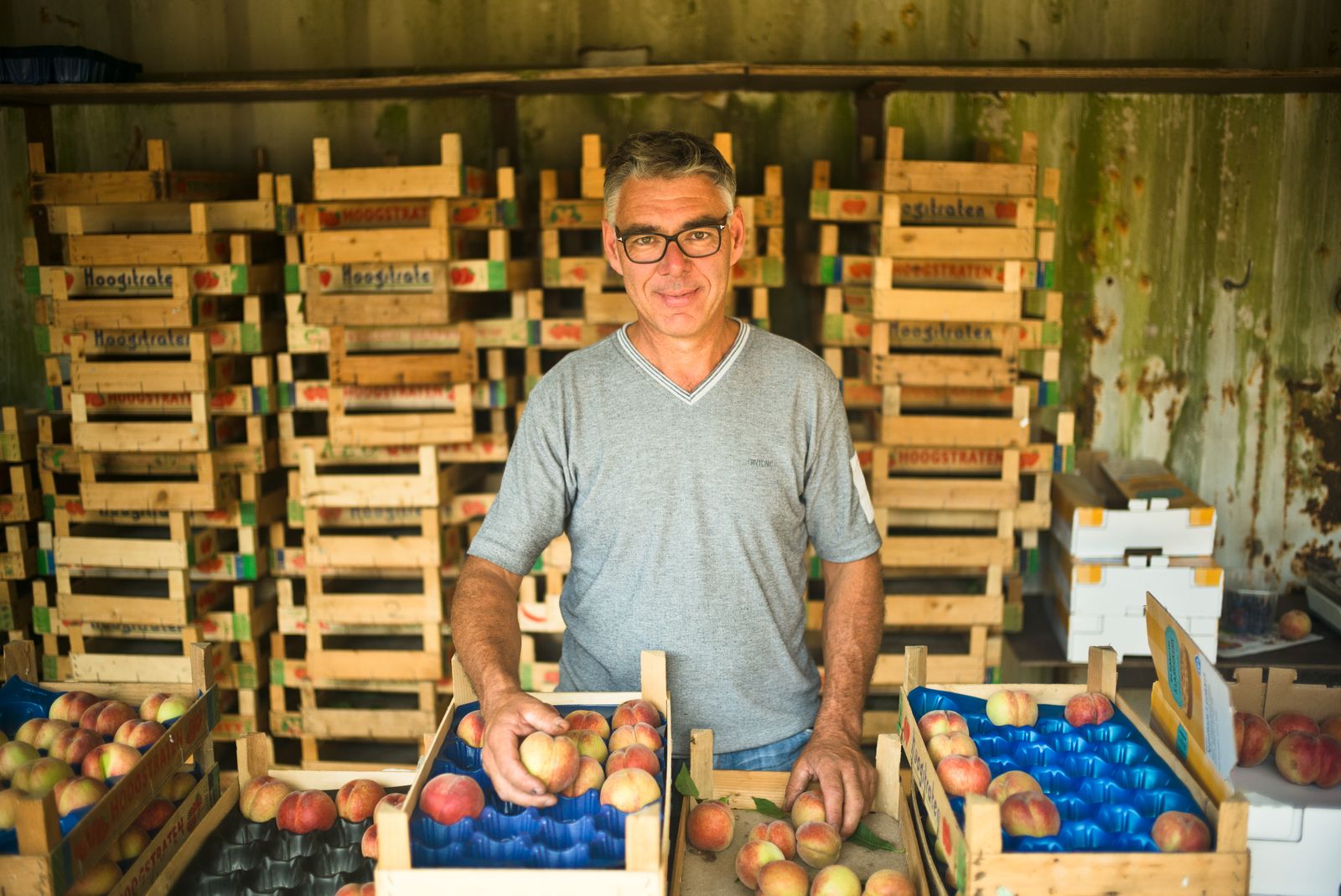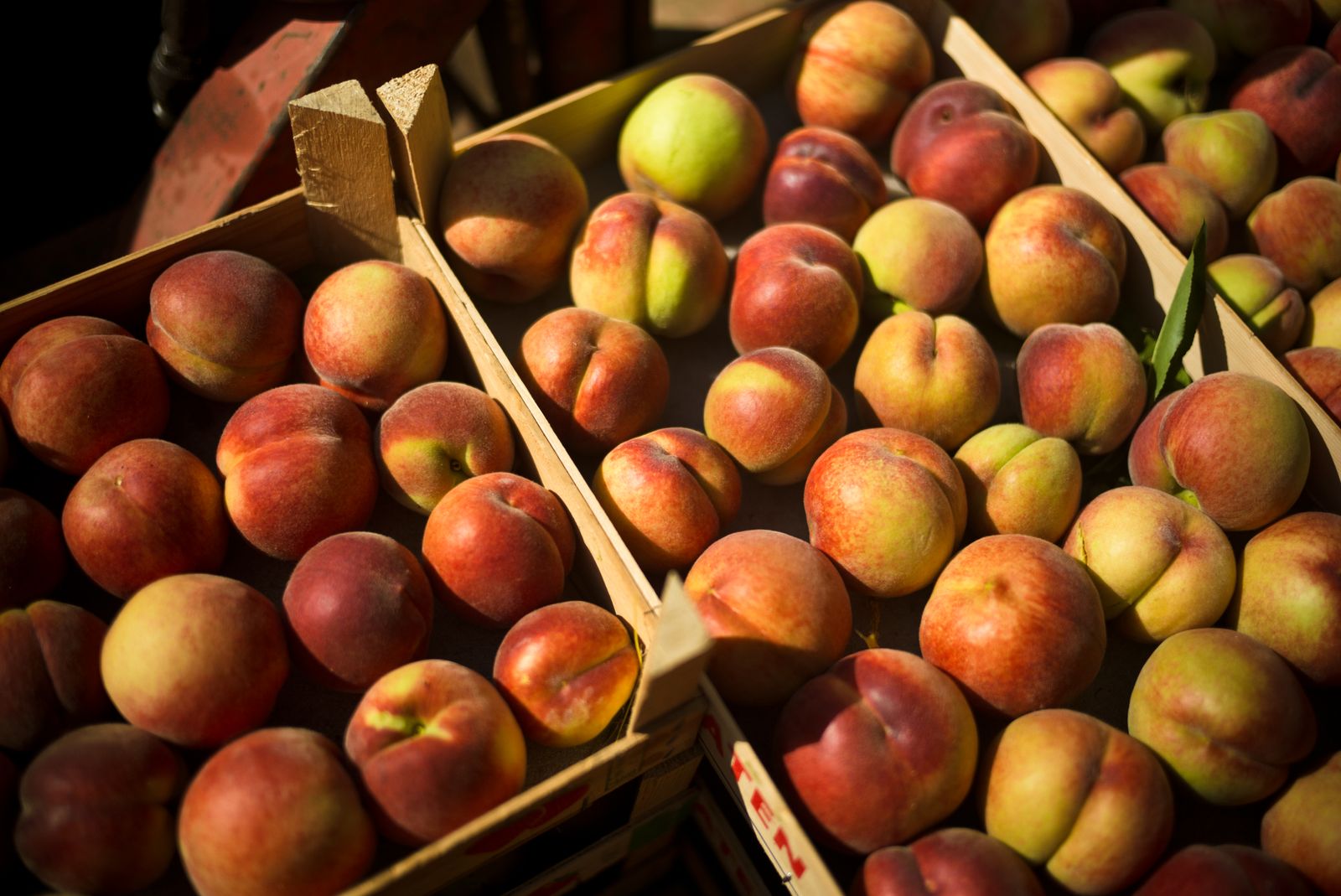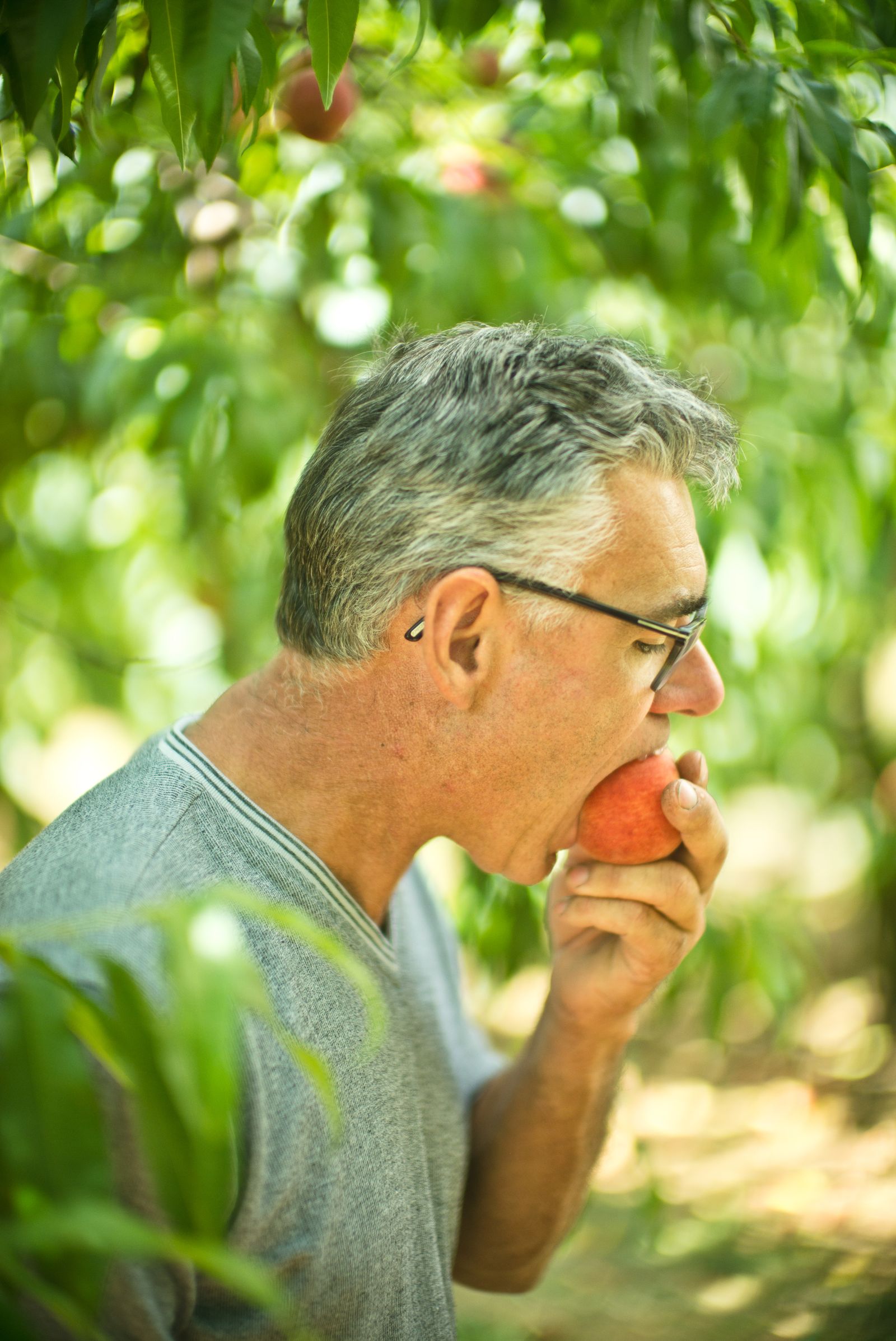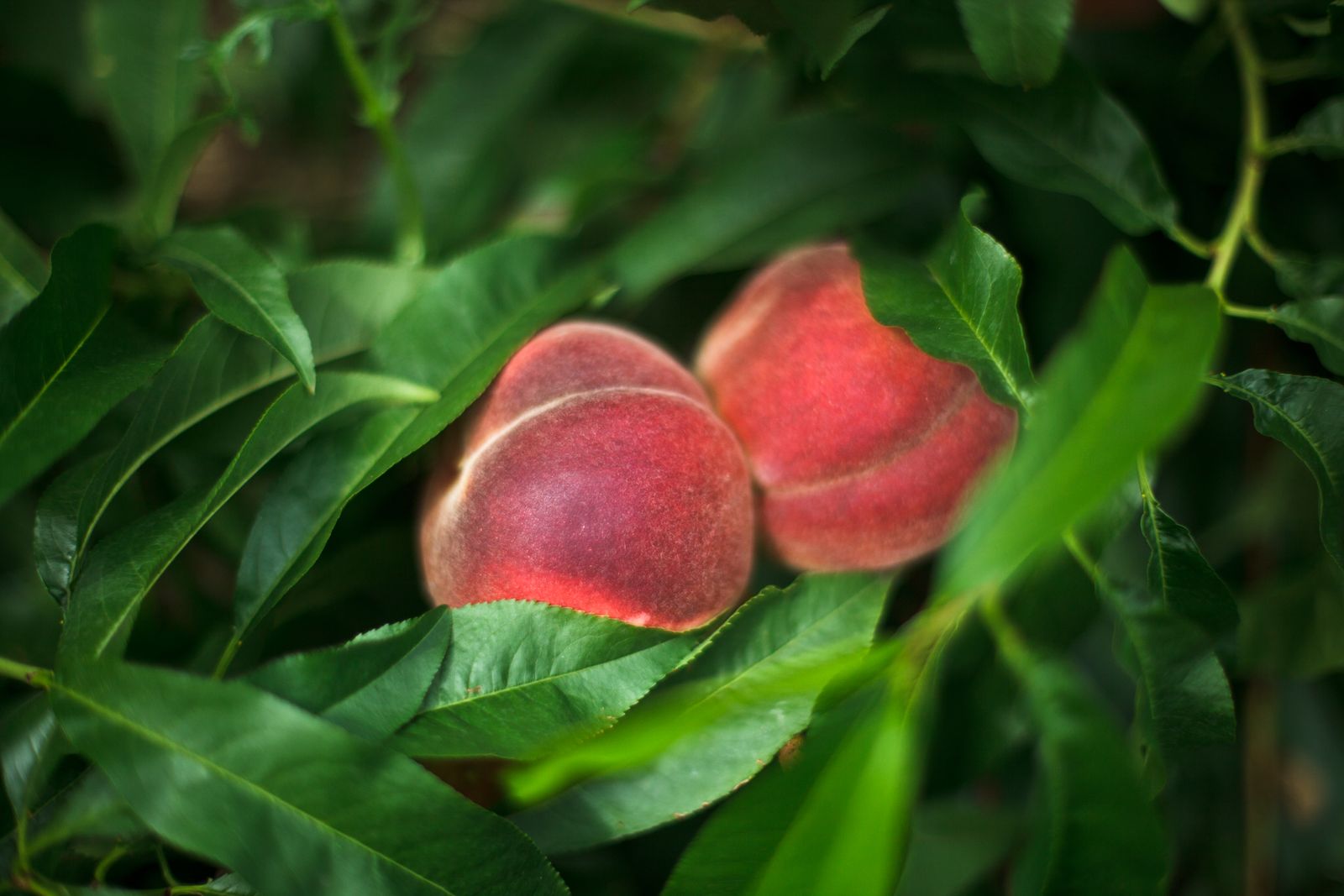In our search for fruit, we like to stay as close to home as possible. Sometimes we have to carefully select the right supplier, sometimes things are plain and simple. When it comes to peaches, there is only one person left in the whole of Belgium who still grows them. Meet Ludo Rosseels from Gelrode.
There is no name for the shop. And there is no need for one, since we are talking about just one stall, at the foot of the hill along the Rillaarsebaan. Ludo's children, and by now his grandchildren as well, sell the peaches there by the tray—there and nowhere else—during the summer months. That is to say, in a good year. Because in 2021, they won't have to occupy their stall much. Hardly any peaches are hanging in that beautiful orchard, they have all frozen to bits. Just like in 2020. And just like in 2019...
Watching the weather report, holding his breath.
We are June 2021. Ludo shakes his head as he walks up the hill between the trees. “For three years in a row now. Look at what's hanging there. Ninety per cent is dead. Normally, around this time, I am culling the young fruit with a stick, now there is nothing to hit.” The problem this year was not the actual frost, but the warm days in February. “They were almost spring days. Nature was confused and got going too early. And so the blossoms were already abundant when the cold nights actually started a month later. And then the flowers were doomed.”
If I throw in the towel tomorrow, the knowledge about peaches in Belgium will be gone. And so will the peaches themselves.
Fruit farmers always hold their breath when they watch the weather forecast. It is no different for Ludo. He pulls out the crumpled piece of paper on which he scribbled the night-time temperature every day. “Look here. It was minus five degrees Celsius at the beginning of March, and look, another minus two, three weeks later. Young blossoms can take one good night’s frost, but not that many.” So he’s lost the fight again, for the third year in a row.

The peach does not fall far from the tree.
Ludo learnt the ins and outs of the trade from his father Willy, who in turn got it from his father Louis. But the future is uncertain and Ludo does not want to force his children. So much work for so little fruit—could you blame them? “That means, if I throw in the towel tomorrow, the knowledge about peaches in Belgium will be gone. And so will the peaches themselves. Some people still have a tree here and there in their gardens, and I think some varieties still grow in the botanical garden in Brussels. But those are museum pieces, they are no longer cultivated.”
That definitely used to be different. Peach trees traditionally filled hectare after hectare in the Hageland. It’s a region with a lot of ironstone soil, which is ideal for sweet peaches. There was good money to be made in growing them, hence the nickname of the street where the farmers lived: Millionaire Street. Ludo has a good laugh about that one: “Today you might as well call it Beggar’s Alley!”

Extra suspension under the cart.
The heyday of the peach in the Hageland region was from the 1930s to the 1950s. In addition to the growers and pickers, the trade also provided an income to ladder makers, basket makers and dung sellers, up to the crate builders who fixed the typical wooden trays in which the peaches were sold. The carriage drivers had to add extra suspension to the carts, so they could safely ward off any shocks to the downy fragile fruit.
In the 1970s, farmers even received a premium to cut down their peach trees and switch to apples or cereals.
Cultivating peaches never was easy. Old growers still remember the disastrous crop failure of 1957. But it was a blow they could absorb with other crops. Ludo's father, for instance, also grew strawberries, beans and chicory. In the 1960s, competition with Spain made things more difficult, but it was in the 1970s that the axe finally fell. Literally. Farmers then received a premium to cut down their trees and switch to apples or cereals. Anything that wasn’t as fickle as those tender peaches. Our industrial agriculture then had only one slogan: cheaper, more, faster, and more of the same.

Bend over a little before you bite.
Exit peach, which is a pity. Because in addition to the juicy fruits, the region lost its juicy stories and traditions, such as the Hageland peach festivals with its annual Peach Queen. Growers all used to have their own peach varieties as well: the Jefkes, the Mandus Verlindens, the Van den Bergs. Ludo didn’t want to be an exception to the rule, so there are also some trees with his own ‘Ludos’ on the hill. Between the Amsdens, the Charles Ingoufs, the Vaes Oogsten...
So, which ones are best for the fruit lambic beers of Brouwerij 3 Fonteinen? “I can't tell you, my friend. If you ask me what the sweetest are, I'll say the white ones, because that's the ones I grew up with. But in a lab they might tell you that the yellow ones hold more sugars. So who is right then? I also like to eat them when they are nice and ripe, so you have to bend over a bit when you bite them. The juice should trickle out. A peach is not an apple, is it? But everybody will have their own opinion on that as well.”

Rare beer made with rare fruit.
The last good harvest was that of 2018. For six days in a row, Ludo then stacked 300 kilos in the early morning, which the 3 Fonteinen team could use to get to work. Some experiments remained in the lambik-O-droom, others made it into full-fledged blends: the Perzik Wit with Vroege Amsden, the Perzik Geel with Red Heaven, the Perzik Wit with Floerkes and Vroege Amsden and then another one with Late Amsden and Floerkes. At 3 Fonteinen we dream of being able to make more peach lambic beers. And although we want to stay as close to home as possible, we are now—out of sheer necessity—searching across the Belgian borders.
I like to eat them when they are nice and ripe, so you have to bend over a bit when you bite them. The juice should trickle out.
And in Gelrode? Well, we’ll just wait, we suppose? Ludo has always kept his Fridays free, and the weekends, and the holiday months. Ask him if he wants to stop, and you will not get a clear answer. And even if he said yes, it would mean no. The sweetness is in his blood. The little Ludo who, as a child, ran up the hill between the fruit trees, still flickers in his eyes. “You know, it's Friday today. So what am I going to do tomorrow? Read the papers? I don’t know.” He’d rather not. See you next year!